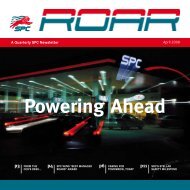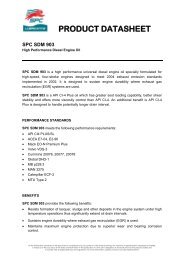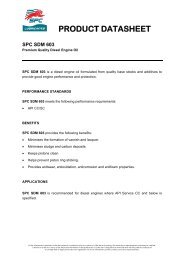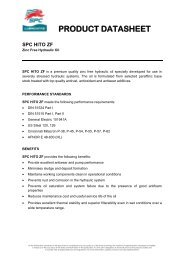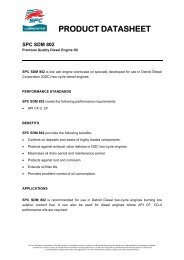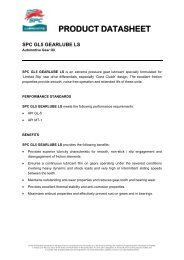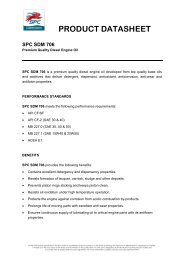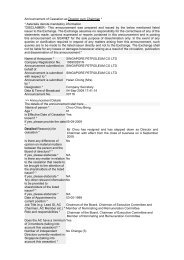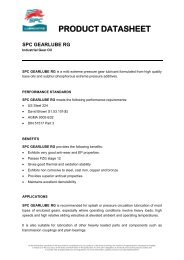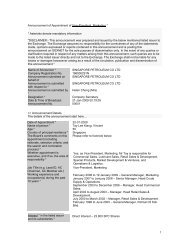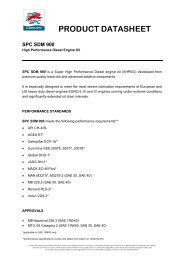Refining, Supply & Trading - SPC
Refining, Supply & Trading - SPC
Refining, Supply & Trading - SPC
You also want an ePaper? Increase the reach of your titles
YUMPU automatically turns print PDFs into web optimized ePapers that Google loves.
Amid stiff competition at Taipei’s Chiang Kai Shek<br />
International Airport, <strong>SPC</strong> managed to maintain its jet<br />
fuel volume of 1,600 bpd. This represents about<br />
16.9 percent of the jet fuel market.<br />
At Hong Kong International Airport, <strong>SPC</strong> achieved a jet<br />
fuel volume of 3,500 bpd. Air traffic continues to grow<br />
strongly at Hong Kong International Airport due to increase<br />
in air passengers and air cargo demand. Currently, <strong>SPC</strong><br />
services four airlines at this location and higher fuel lifting<br />
by its air cargo customers enabled <strong>SPC</strong> to register a<br />
modest three percent growth in volume in 2005 over<br />
the previous year.<br />
In its second year of operation at Bangkok International<br />
Airport, <strong>SPC</strong> continued to strengthen its ground<br />
co-ordination and logistics set-up to enhance its<br />
into-plane refuelling services. <strong>SPC</strong> achieved a slightly<br />
higher market share in this highly competitive market<br />
and presently services five airlines at this location.<br />
2006 will be another challenging year for the aviation<br />
industry as major carriers continue to streamline their<br />
operations through efficiency gains, cost-saving measures<br />
and consolidation in order to cope with high fuel prices.<br />
Distillates<br />
The Distillates unit is responsible for the sale and trading<br />
of distillate products. Distillate products represent the<br />
lighter end of the refining process and include chemical<br />
naphtha, motor gasoline, jet fuel and gas oil. Besides<br />
trading the products from SRC, the Distillate unit also<br />
sourced such products from third parties including other<br />
refineries and oil traders.<br />
With the Group’s increased refining capacity since<br />
mid-2004, the volume of distillate products available to<br />
the unit had increased. The Distillate unit was also able<br />
to capitalise on trading opportunities and hence registered<br />
an increase in trading volume. The unit was thus able<br />
to capture a larger share of the demand for distillate<br />
products. Demand for distillates reached historic highs<br />
during the third quarter of 2005 due to the hurricanes<br />
in the US Gulf Coast.<br />
Despite the robust global demand for refined products,<br />
distillate trading remained a challenging activity given<br />
the continued price volatility. The unit had to trade and<br />
compete aggressively to capture profitable sales. In 2005,<br />
the Distillate unit achieved a turnover volume of 35 million<br />
barrels, a growth of 35 percent over the previous year.<br />
To sustain the unit’s performance, continued emphasis<br />
will be placed on prudent management of inventories.<br />
Traders in the unit monitor the market closely to capture<br />
opportunities whenever they arise.<br />
The tight global refining capacity is expected to persist<br />
over the next two to three years. Growth momentum in<br />
the demand for distillate products is likely to be maintained<br />
as well. The expected growth in air travel would also<br />
result in higher consumption of jet fuel and will provide<br />
opportunities for the unit to increase its jet fuel trading.<br />
The unit will therefore continue to play a key role in the<br />
Company’s downstream activities and profitability in 2006.<br />
Residue<br />
<strong>SPC</strong> has been in the bunkering business since 1972 and<br />
is a leading and reliable supplier in Singapore. The Residue<br />
unit handles the sale of bunker fuels and the trading of<br />
fuel oil for the Group.<br />
Singapore has maintained its status as one of the world’s<br />
top bunkering port with more than 3,200 ships registered<br />
under the Singapore flag. The maritime sector in Singapore<br />
achieved an excellent growth rate in 2005. Singapore<br />
set new records for shipping tonnage, container and<br />
cargo throughput and bunker sales. For the second time<br />
in Singapore's maritime history, total vessel arrivals in<br />
terms of shipping tonnage crossed the one billion mark<br />
with 1.2 billion gross tonnes (GT) in 2005, outstripping<br />
2004's 1.04 billion GT. Container traffic increased by<br />
8.7 percent to 23.2 million twenty-foot equivalent units<br />
(TEUs) in 2005 from 21.3 million in 2004, setting a new<br />
record for the Singapore port. A healthy growth rate<br />
of 7.6 percent was also recorded for cargo throughput<br />
which topped 423 million tonnes in 2005. Given the<br />
growth in shipping tonnage, sales of bunker fuels crossed<br />
25 million tonnes in 2005, surpassing the 2004’s record<br />
of 23.6 million tonnes.<br />
Average fuel oil prices had risen almost 60 percent<br />
in 2005 as compared to 2004. Fears of supply<br />
disruption brought about by the hurricanes in end August<br />
hiked fuel prices to record highs, affecting demand<br />
especially from China. 2005 also witnessed irregular<br />
import volumes into Singapore due to volatile prices and<br />
freight costs. In the face of these uncertainties, the unit<br />
adopted a cautious approach especially in its fuel oil<br />
trading activities.<br />
A higher growth rate in the maritime sector in Singapore<br />
provided sustained business opportunities for the Residue<br />
unit in 2005. However, sustained high prices and demandsupply<br />
imbalances continued to challenge the marine<br />
fuel traders and suppliers. The Residue unit was able to<br />
effectively manage these challenges to meet its delivery<br />
commitments during the year.<br />
In May 2005, the International Maritime Organisation<br />
mandated higher quality standards for marine fuels. The<br />
unit worked closely with SRC to ensure that its fuel oil<br />
products met the quality standards of MARPOL (Marine<br />
Pollution) 73/78 Annex VI.<br />
37



